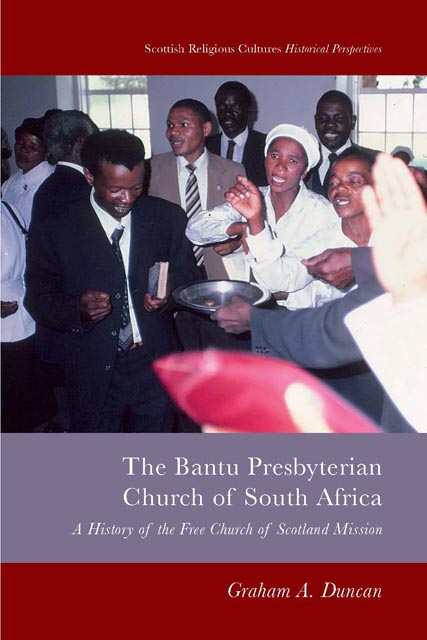Book contents
- Frontmatter
- Contents
- Acknowledgements
- Timeline
- A Presbyterian Anthem
- Introduction
- 1 Background to this Study
- 2 The Origins and Early Development of Scottish Presbyterian Mission in South Africa, 1824–65
- 3 Rev. Tiyo Soga (1829–71): A Paragon of Early Indigenous Leadership
- 4 The Role of Mission Councils in the Scottish Mission in South Africa, 1864–1923
- 5 The Rev. Edward Tsewu’s Dispute with the Free Church of Scotland Mission
- 6 The Mzimba Secession, 1898: A South African ‘Disruption’
- 7 Presbyterianism in South Africa, 1897–1923: To Unite orNot to Unite?
- 8 Preparations for the Formation of the Bantu Presbyterian Church of South Africa, 1897–1919
- 9 The Formation of the Bantu Presbyterian Church of South Africa, 1920–3
- 10 Mission to Church – Church to Mission: The First Ten Years, 1923–33
- 11 Reaching Out: The Bantu Presbyterian Church in South Africa and the Presbyterian Church of South Africa and Ecumenism, 1923–39
- 12 The Bantu Presbyterian Church in South Africa and Ecumenism, 1940–99
- 13 The End of Mission Councils: The Church of Scotland South Africa Joint Council, 1971–81
- 14 A Young Church in Mission or Maintenance Mode?: The Bantu Presbyterian Church of South Africa, 1923–99
- 15 The Bantu/Reformed Presbyterian Church and Socio-political Issues
- 16 Bantu/Reformed Presbyterian ChurchWomen in Leadership in Ministry
- Conclusion: Indigenous Presbyterians and Missionaries –Transferring Contending Roles and Responsibilities
- Bibliography
- Index
Conclusion: Indigenous Presbyterians and Missionaries –Transferring Contending Roles and Responsibilities
Published online by Cambridge University Press: 26 November 2022
- Frontmatter
- Contents
- Acknowledgements
- Timeline
- A Presbyterian Anthem
- Introduction
- 1 Background to this Study
- 2 The Origins and Early Development of Scottish Presbyterian Mission in South Africa, 1824–65
- 3 Rev. Tiyo Soga (1829–71): A Paragon of Early Indigenous Leadership
- 4 The Role of Mission Councils in the Scottish Mission in South Africa, 1864–1923
- 5 The Rev. Edward Tsewu’s Dispute with the Free Church of Scotland Mission
- 6 The Mzimba Secession, 1898: A South African ‘Disruption’
- 7 Presbyterianism in South Africa, 1897–1923: To Unite orNot to Unite?
- 8 Preparations for the Formation of the Bantu Presbyterian Church of South Africa, 1897–1919
- 9 The Formation of the Bantu Presbyterian Church of South Africa, 1920–3
- 10 Mission to Church – Church to Mission: The First Ten Years, 1923–33
- 11 Reaching Out: The Bantu Presbyterian Church in South Africa and the Presbyterian Church of South Africa and Ecumenism, 1923–39
- 12 The Bantu Presbyterian Church in South Africa and Ecumenism, 1940–99
- 13 The End of Mission Councils: The Church of Scotland South Africa Joint Council, 1971–81
- 14 A Young Church in Mission or Maintenance Mode?: The Bantu Presbyterian Church of South Africa, 1923–99
- 15 The Bantu/Reformed Presbyterian Church and Socio-political Issues
- 16 Bantu/Reformed Presbyterian ChurchWomen in Leadership in Ministry
- Conclusion: Indigenous Presbyterians and Missionaries –Transferring Contending Roles and Responsibilities
- Bibliography
- Index
Summary
The Bantu Presbyterian Church of South Africa (BPCSA) was the first denomination to be formed as a result of the work of a foreign mission in South Africa that did not secede as a protest against various forms of oppression suffered at the hands of missionaries. Its gestation period was over 100 years but these were years of intense activity and faithfulness on the part of both missionaries and indigenous people. Historically, much more credit has been given to the missionaries than to the indigenous Christians and their PR model worked well in their favour to secure the funds that were required to promote and further their work among indigenous South African peoples.
It is impossible to write such a history without taking account of the secular context for the secular and sacred are integrated in real life. This is nowhere more true than in South Africa where one expression of Christianity both legitimised and promoted a heretical secular ideology, apartheid, while another focused on its essentially humanitarian nature; both of which views drew on scripture for support. One Christianised dimension of this coexistence of the sacred and the profane was the extension of evangelisation to include education, medical mission, agriculture and industrial education in the mission institutions as a means of both educating and maintaining peace among the indigenous people (as in Sir George Grey's reforms in the 1850s). This led to the coalition of colonialism, Christianisation, commercialism, civilisation and conciliation of the local population in different combinations at different periods and for different lengths of time. The missionaries were involved in all of these activities.
The missionaries arrived in South Africa during a troubled time, distinguished and characterised by racism, and had to struggle through and survive the 100 years Wars of Dispossession and the horrendous impact of the cattle-killing tragedy within a population which was under constant political, cultural and economic and social pressure. This continued into the twentieth century following the trauma of the South African War (1899–1902), leading to the formation of the Union in 1910, where the hopes and aspirations of black people were betrayed in favour of the appeasement of the Afrikaans people.
- Type
- Chapter
- Information
- Bantu Presbyterian Church of South AfricaA History of the Free Church of Scotland Mission, pp. 212 - 214Publisher: Edinburgh University PressPrint publication year: 2022

